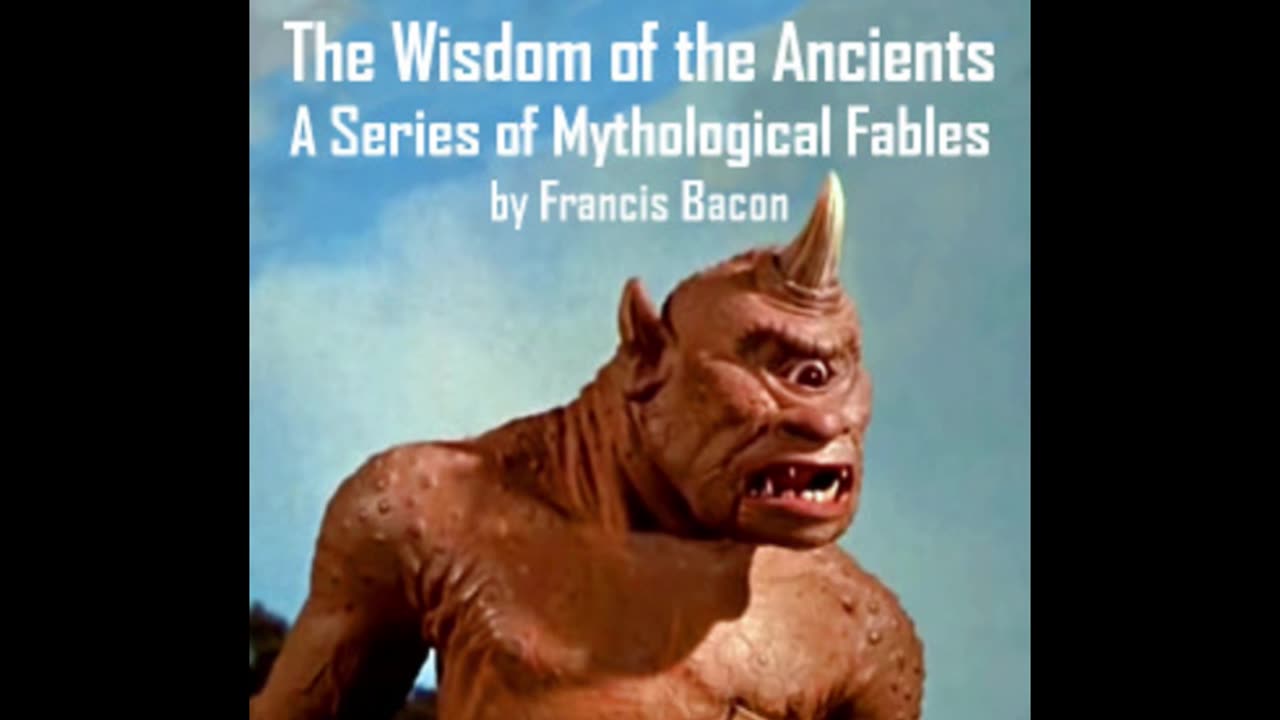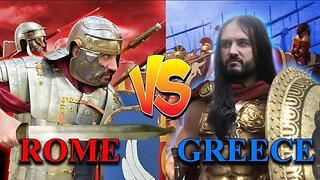Premium Only Content

The Wisdom of the Ancients, A Series of Mythological Fables by: Francis Bacon (1609)
The Wisdom of the Ancients, A Series of Mythological Fables by Francis Bacon, first published in 1609, is a collection of thirty-one mythological fables that Bacon interprets allegorically to extract philosophical and moral lessons. Bacon’s intent is to reveal the hidden wisdom embedded within ancient myths, proposing that they contain insights into natural philosophy, ethics, and human behavior. Each myth is carefully analyzed to show how it reflects broader truths about society and the human condition.
The fables in this collection explore a wide range of topics through classical myths, reinterpreted by Bacon in a way that aligns with his philosophical outlook. Bacon believed that these myths were not mere stories but encoded messages passed down by the ancients, offering wisdom on matters such as governance, ambition, knowledge, and moral conduct.
List of Fables in the Book:
1. Cassandra, or Divination
2. Typhon, or a Rebel
3. The Cyclops, or the Ministers of Terror
4. Narcissus, or Self-Love
5. The River Styx, or Leagues
6. Pan, or Nature
7. Perseus, or War
8. Endymion, or a Favorite
9. The Sister of the Giants, or Fame
10. Actaeon and Pentheus, or a Curious Man
11. Orpheus, or Philosophy
12. Coelum, or the Origin of Things
13. Proteus, or Matter
14. Memnon, or a Youth too Forward
15. Tithonus, or Satiety
16. The Giants’ War, or the Monarchy of Rome
17. Cupid, or an Atom
18. Diomedes, or Zeal
19. Dionysus, or Desire
20. Atalanta, or Profit
21. Prometheus, or the State of Man
22. Icarus, or the Fall of Ambition
23. Sphinx, or Science
24. Proserpina, or Spirit
25. Metis, or Counsel
26. Daedalus, or Mechanic
27. Eros, or Friendship
28. The Sirens, or Pleasure
29. The Palace of Fame
30. Echo, or Talkativeness
31. The Fates, or Necessity
Significance:
Each fable is accompanied by Bacon’s analysis, where he extracts deeper meanings related to natural phenomena, human virtues, and societal structures. For instance, the story of Prometheus is interpreted as a reflection on the nature of human knowledge, ambition, and the potential consequences of seeking enlightenment.
The Wisdom of the Ancients remains an important work for those interested in the allegorical interpretation of mythology, philosophy, and the intersection of classical and early modern thought.
About the Author:
Francis Bacon (1561-1626) was an English philosopher, statesman, scientist, and author whose contributions to the development of empiricism and the scientific method laid the foundation for modern scientific inquiry. Serving as Attorney General and Lord Chancellor of England, Bacon was a major political figure, but his true legacy lies in his intellectual work, which bridged science, literature, and esoteric traditions.
Bacon’s writings, including Novum Organum and The Advancement of Learning, argued for a methodical approach to scientific investigation through observation and inductive reasoning. This approach fundamentally challenged the scholastic traditions of the Middle Ages and propelled the development of modern science. His vision was of a world where knowledge could be systematically gathered, tested, and applied to improve society—a vision encapsulated in his utopian work The New Atlantis.
1. Rosicrucianism:
Francis Bacon is often linked to the Rosicrucians, a mystical brotherhood that emerged in the early 17th century, which claimed to possess secret knowledge blending science, alchemy, and spiritual wisdom. Some researchers and esoteric scholars suggest that Bacon was either directly involved in the Rosicrucian movement or inspired its principles. The New Atlantis has been interpreted as an allegory for the ideals of Rosicrucianism, particularly in its portrayal of a society dedicated to the pursuit of hidden knowledge and spiritual enlightenment.
2. Freemasonry:
Although the official formation of Freemasonry occurred after Bacon’s death, many Masonic historians and scholars speculate that Bacon’s influence was instrumental in shaping its early structure and philosophy. Some even consider him the "founder" or guiding spirit behind early speculative Freemasonry, citing his emphasis on knowledge, symbolism, and moral philosophy as aligned with Masonic principles. His intellectual legacy is said to have informed the development of Masonic rituals, particularly those relating to the search for truth and the betterment of humanity.
3. The Order of the Helmet:
Bacon is rumored to have founded a secret literary society called the "Order of the Helmet," dedicated to the protection and promotion of esoteric knowledge and literature. This group, supposedly comprised of intellectual elites, is said to have operated in secrecy, exploring the deeper meanings behind classical texts, philosophy, and spiritual practices.
4. The Shakespeare Authorship Debate:
One of the most enduring theories surrounding Bacon is the claim that he was the true author of the works attributed to William Shakespeare. Proponents of this theory argue that Bacon’s vast knowledge, literary skill, and involvement in secret societies gave him the resources and motivation to write the plays and sonnets under a pseudonym. They suggest that hidden codes and allegories within Shakespeare’s works reveal Bacon’s authorship and his connection to esoteric traditions.
Francis Bacon’s influence extends beyond his contributions to science and literature; he is revered in various esoteric and mystical traditions for his visionary ideas on knowledge and enlightenment. His works are considered foundational texts for those studying the intersection of science, spirituality, and secret societies. Whether as a scientist, philosopher, or esotericist, Bacon’s intellectual endeavors were consistently aimed at uncovering the hidden truths of the universe, making him a key figure in the history of Western esotericism.
Bacon’s legacy is both celebrated and shrouded in mystery, with his influence resonating in Freemasonry, Rosicrucianism, and beyond. His vision of a world united by the pursuit of knowledge and truth continues to inspire those in both scientific and mystical fields.
-
 12:17:16
12:17:16
Deus Meum Que Jus
7 days agoWilliam Cooper - HOTT - Asset Protection Series 8.99
6251 -
 19:53
19:53
MetatronHistory
21 hours agoRome VS Greece - Ultimate Clash of Civilizations Explained
49.6K15 -
 LIVE
LIVE
The Big Mig™
7 hours agoThe Big Mig Show's Greatest Hits w/ Americas Future, Karmageddon, Operation Gideon,..
161 watching -
 1:32:33
1:32:33
VapinGamers
6 hours ago $6.08 earnedTools of the Trade - EP12 The Art of Story Telling with MidnightinTheMountains - !rumbot !music
34.9K4 -
 3:09:50
3:09:50
SOLTEKGG
5 hours ago🔴LIVE - Battlefield 6 - Going Pro in RED SEC
33.5K2 -
 5:19:03
5:19:03
Midnight In The Mountains™
7 hours agoThe Midnights Play Arc Raiders | Loot Scoot and KILL | Crypto Wallet up n running GO JOIN THE BETA!
26.1K4 -
 53:25
53:25
X22 Report
8 hours agoMr & Mrs X - Trump Is Using The Same Tactic As Our Founding Fathers To Rebuild America - EP 17
102K37 -
 3:15:31
3:15:31
PudgeTV
5 hours ago🟣 Arc Raiders - Gaming on Rumble | Going Topside w My Daughter’s Husband
18.9K2 -
 2:05:43
2:05:43
LFA TV
1 day agoRUMBLE RUNDOWN WEEK 7 with SHAWN FARASH 11.22.25 9AM
152K15 -
 3:23:01
3:23:01
ttvglamourx
6 hours ago $1.84 earnedGLAMOURX VS CALL OF DUTY LOBBIES !DISCORD
21.5K4